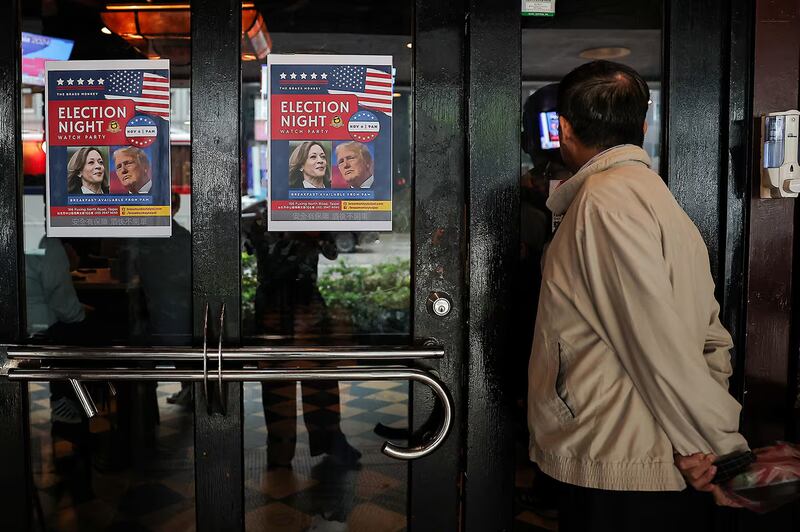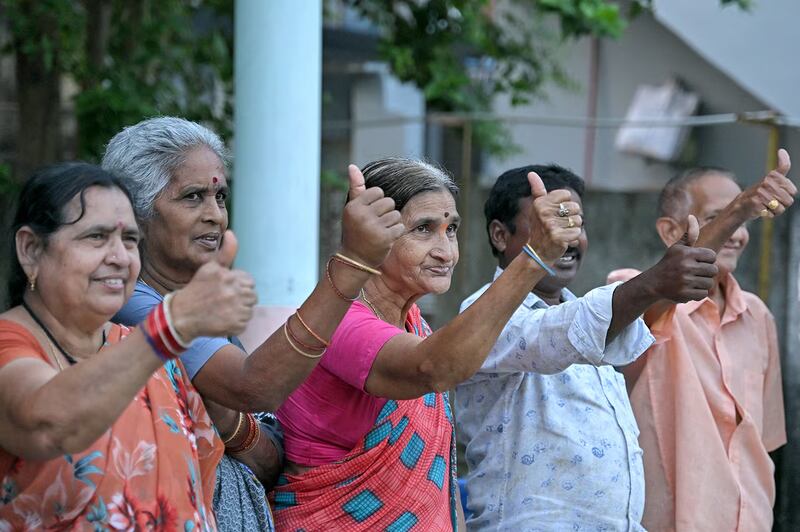Former President Donald Trump's election victory was welcomed in Asia Wednesday for U.S. policies seen as tougher on China and pro-India, even as some people worried about the fallout on their economies from any trade war.
Interviews conducted across Asia from New Delhi to Taipei by Radio Free Asia and BenarNews also found people expecting a narrow U.S. focus on its own interests and concern about the state of American and global democracy.
“I think the Taiwan Strait will be safer,” a Taipei man who gave only his surname, Lee, told RFA Mandarin.
The U.S. presidential election played out amid rising Chinese military pressure on Taiwan to get the self-ruled island to accept Beijing’s terms for unification, and Lee noted that Trump has sent conflicting messages about the longstanding Asian ally.
“He says he wants protection money from Taiwan. He says we took jobs,” he said, referring to Trump’s demands Taipei pay more for its defense and his accusations that Taiwan stole the U.S. semiconductor industry.
“Just because he says it, doesn’t mean he’ll do it when he takes office,” Lee said.
RELATED STORIES
[ Live U.S. election mapOpens in new window ]
[ EXPLAINED: How would Harris and Trump differ on Asia?Opens in new window ]
A woman in Taipei surnamed Liu said she expected nothing different under Trump.
“My personal opinion is that Americans will always prioritize their own interests,” she said.
“I don’t think we need to rest our hopes or place our bets that any one candidate will be that much better for Taiwan,” added Liu.

In the Himalayan state of Sikkim in northeastern India, a Tibetan resident named Karma Trinley said he welcomed a tough line on China, which has occupied Tibet since 1950.
“As a Republican candidate, both he and his party have maintained a firm stance on China, so we are hopeful that his presidency may have a positive impact on the Tibetan cause,” he told RFA Tibetan.
In New Delhi, Indian residents viewed Trump favorably on the basis of his first-term relationship with long-serving Indian Prime Minister Narendra Modi.
“Donald Trump or Kamala Harris, whoever is better for India, is what matters to us,” said IT worker Prashant.
“If we look at the relationship between Modi and Trump, it was quite fruitful in the past. I hope that India and U.S. relationship goes (to) a new high,” he said.
Indians who spoke to RFA cited Trump’s business background as a reason for pinning their hopes on him.
Surender Singh, owner of an immigration business, appeared to hedge his bets.
“Donald Trump is a great person and he deserves to win – though Kamala Harris, who has ancestral roots to India, should not have lost, too,” he said.

In Malaysia, Trump’s victory and promised tough stance on China raised concerns their country had moved too close to Beijing and could suffer fallout.
“There have been concerns over the Malaysian government’s statements that seemed anti-U.S. and pro-China and pro-Russian,” George Jacob, a 68-year-old retiree, told BenarNews, a news organization affiliated with RFA.
“Whether Trump or Harris, we have upset them – but more so Trump who may be less forgiving,” he said, referring to Malaysia’s recent decision to join China, Russia and others in the BRICS economic grouping.
Akil Yunus said his country’s tilt toward China could have economic costs to economies like Malaysia as tariffs are passed along among Asian manufacturing networks.
“With Trump, we might face challenges of higher tariffs because we are aligning more with China, and Trump may also want to hike tariffs to boost U.S. economy and manufacturing,” said the 21-year-old Grab delivery rider and mechanical engineering student.
“It will be tough for people like us because local manufacturers may pass the higher cost to consumers,” added Yunus.
In Cambodia, people focused on the impression that the U.S. election was free of the coercion and corruption that has marred recent polls in the Southeast Asian nation.
“In the U.S election [voters] were not pressured or taught to pre-select the ballots,’ said casino worker Morm Sovantin.
“This is what I’ve observed because I want to see the difference between the U.S. and Cambodian elections,” she told RFA Khmer.
Bangladeshi private university student Shamsunnahar Sumi, however, saw behind Trump’s victory the specter of the Jan. 6 political violence which followed Trump’s defeat in 2020.
“Trump in advance said that the elections would be fair only when he wins, and he won. This type of reaction would encourage candidates in future elections to behave like him. This will not be good for global democracy,” she told BenarNews.
RFA Mandarin, RFA Tibetan, RFA Khmer and BenarNews journalists contributed to this report.
Radio Free Asia is an online news service affiliated with BenarNews.
